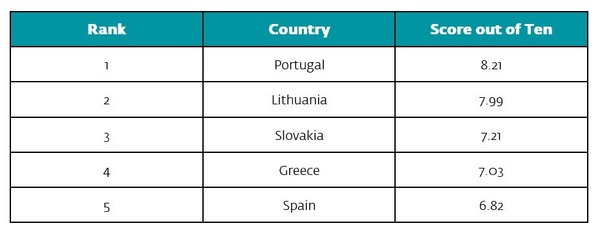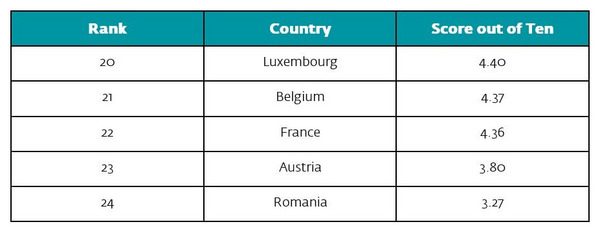A new study into countries with the best levels of online security has found Portugal is leading Europe as the most cyber-safe.
LONDON, UK – ESET, a global leader in cybersecurity, has released The European Cybersecurity Index, an in-depth study revealing the countries in Europe with the best and worst levels of online safety.
The study looked at seven cybersecurity factors, producing a score out of ten for 24 European countries, and can reveal Portugal is the best for cybersecurity, while Romania is the worst.
The factors included the number of pieces of cybersecurity legislation, the percentage of each country’s residents who’ve fallen victim to bank card or online banking fraud in the last three years and the percentage in each nation whose social network or email accounts were hacked in the last three years.
The top five countries with the best cybersecurity:
The research found that Portugal scored highest for cyber safety with a result of 8.21 out of 10, followed by Lithuania and Slovakia, who produced scores of 7.99 and 7.21 respectively. Notably, the United Kingdom finished outside of the top 10, placing 16th out of 24 with a score of 5.59.
The countries with the worst cybersecurity:
Romania ranked as the worst country in Europe for cyber safety with a score of 3.27 out of 10; they also have the fewest pieces of cybercrime legislation in Europe, totalling just two legislation acts. Perhaps surprisingly, Romania was joined in the bottom three by Austria and France, who scored 3.80 and 4.36 respectively.
The United Kingdom has the lowest exposure rank in Europe, with a score of 5 (lower rank indicates a higher exposure, exposure rank indicates how exposed each country is to cybercrime). Meanwhile, the UK also scored the highest for commitment to cybersecurity with a score of 0.931 (out of 1).
Jake Moore, Cybersecurity Specialist for ESET, commented on the findings:
“No single measure – whether it’s the amount of legislation or the number of banking fraud victims – can tell the whole story when it comes to cybersecurity. Protecting citizens online is incredibly complicated, and there’s no one right way to do it. In practice, cyber safety can mean different things for different people, so this is not a case of ‘one size fits all’. Nonetheless, it’s important for nations to be aware of the actions taken across Europe and learn from one another wherever possible. A truly holistic approach to cybersecurity requires a breadth of knowledge about potential approaches, including how and when they work best.
While it’s disappointing to see the UK ranking so far down The European Cybersecurity Index, it is encouraging that the nation has scored so highly for commitment to cybersecurity. With every new initiative, we become a step closer to a safer internet for everyone. Ultimately, cybersecurity works best when we work together, whether that’s between individual people or entire countries. As the internet is international, no one country can be responsible for cyber safety. Recent events have shown us that co-operation and collaboration are more important than ever.”
The European Cybersecurity Index – full report and findings – can be found here.
Methodology
We analysed countries on the below factors, giving each a normalised score out of ten on each factor before taking an average score across all factors, with countries omitted if data wasn’t available for each factor.
- Exposure Rank – This score is taken from Rapid 7’s National Exposure Index 2018 with a lower number in the ranking indicating a higher risk of exposure.
- Commitment to Cybersecurity – This was taken from the ITU publication Global Cybersecurity Index 2018 and is scored on a scale of 0-1.
- Victims of Malicious Software, Social Network or Email Hacking, Online Banking Fraud, Identity Theft – These four factors were taken from the Eurobarometer survey, Europeans’ Attitudes Towards Cyber Security with percentages indicating the percentage of respondents who had fallen victim to each of these factors in the last three years.
- Cybersecurity Legislation – This comes from the Cyber Regulation Index and looks at seven possible categories for cybersecurity legislation. The number given indicates the number of these categories in which each country has legislation.
About ESET
For more than 30 years, ESET® has been developing industry-leading IT security software and services to protect businesses, critical infrastructure and consumers worldwide from increasingly sophisticated digital threats. From endpoint and mobile security to endpoint detection and response, as well as encryption and multi-factor authentication, ESET’s high-performing, easy-to-use solutions unobtrusively protect and monitor 24/7, updating defences in real time to keep users safe and businesses running without interruption. Evolving threats require an evolving IT security company that enables the safe use of technology. This is backed by ESET’s R&D centres worldwide, working in support of our shared future. For more information, visit our website or follow us on LinkedIn, Facebook, and Twitter.

